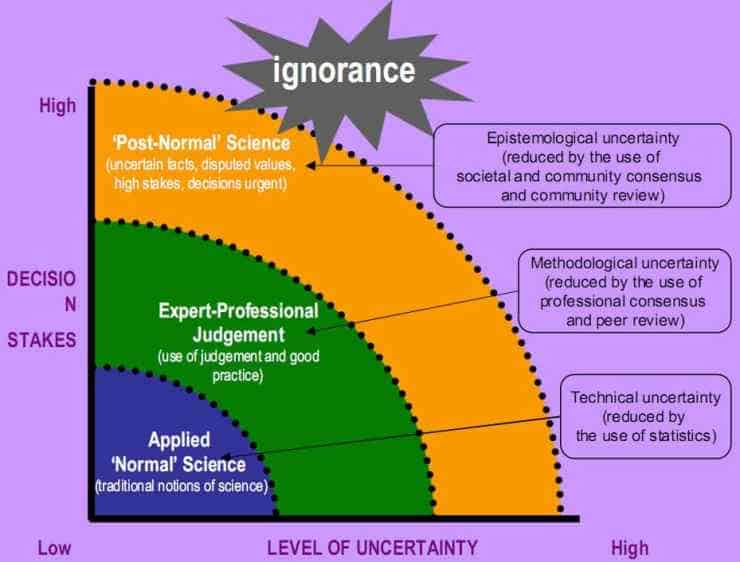 Post-normal science is an idea that we seldom talk about in the forest-related sciences.
Post-normal science is an idea that we seldom talk about in the forest-related sciences.
The graph above shows the basic concepts, and there is a fairly explanatory Wikipedia review here. There is also a very active PNS academic community. Sometimes it’s hard to wade through the academic-ese, but if you can look through that, there are some ideas that may be helpful in the interface between science and policy.
When I worked at the Forest Service in Research and Development, I remember many discussions with the person in my group assigned to “science and management.” His model was basically what I call the “briefcase under the bridge” model..scientists come up with what the problems are, what disciplines are involved, and how the research is to be done. They get answers for what (in this case, National Forest folks) should do, and leave it under the bridge. If National Forest folks pick up the briefcase and don’t use everything, perhaps because they disagree with what the problems are or any of the other decisions, they are accused of “not following the science.” In retrospect, perhaps I should have invited some PNS experts to give seminars.
A summary of papers from the 2014 and 2015 PNS meetings can be found here.
In fact, there is a conference (PNS5) this year in Florence, Italy, for those interested in getting a taste for current research in the area. Registration is only 50 Euros for non-academics and other interested people.
The below is from a description of a paper in that collection by Konig, Borsen and Emmeche.
The ethos of Post-normal science”, gives an overview of important concepts of PNS, and investigates the norms and values of PNS through a structured literature review. The authors refer to Funtowicz and Ravetz’s (1993, 2008) development of PNS from the mid-1980s onwards, and describe the conditions characterizing a post-normal situation: Irreducible complexity, deep uncertainties, multiple legitimate perspectives, value dissent, high stakes, and urgency of decision-making. PNS seeks to cope with such situations through extended peer communities encompassing broader notions of knowledge, uncertainty management, and acknowledgement and management of multiple valid perspectives. Unlike normal science, the goal is not to attain certain knowledge. The goal of PNS is quality, a more robust ‘science for policy’. Inspired by the legacy of the Mertonian norms of CUDOS (Communalism, Universalism, Disinterestedness, and Organized Skepticism), the authors point to how politicization of science renders Merton’s norms invalid. Through their analysis of 33 norms and values found in 397 PNS-related documents, they identify an ethos for PNS which they denominate TRUST (Transparency, Robustness, Uncertainty management, Sustainability, and Transdisciplinarity), considered as a nexus for reflexivity practices. They propose that the public trust in science advice can be restored through the PNS ethos.
And a paper by Scott Bremer “Have we given up too much? On yielding climate representation to experts.” Here’s the abstract:
Our representations of climate are changing, and with them the ways we claim to know our local climates, and live according to them. Amidst this destabilising change in natural and social orders, scientific representations of climate are emerging as dominant. In this perspective piece I start from post-normal science and offer two arguments against completely yielding climate representation to experts, illustrated by my experiences in northeast Bangladesh. Descriptively, abandoning non-scientific representations and knowledge of climate results in a smaller and more fragile knowledge base for adaptation. Normatively, it is our common enterprise to rediscover the places we inhabit; it is not the responsibility of the expert community alone to reinterpret our places under a changing climate. Looking at the co-existence of modern and pre-modern representations of climate in Bangladesh, I suggest that post-normal science approaches may help bridge these different representations, with equal attention to their quality for adaptation, and the values and meanings underpinning them
(my bold).
Perhaps The Smokey Wire sometimes behaves like the “extended peer community” envisioned in the PNS literature. I’m bringing up this literature because many folks claim that climate change is the poster child of a problem that requires PNS concepts and practices, and we’ll be looking more deeply into that as the Voyage continues.